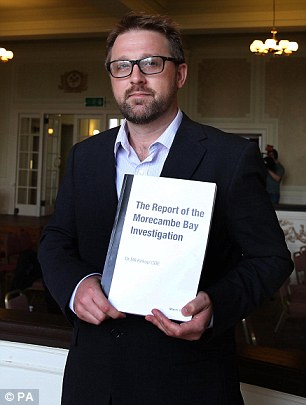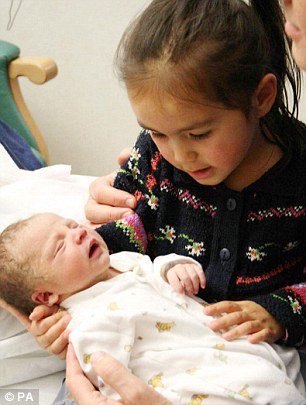
The health service was found to be at fault for the deaths or maiming of 1,316 newborns in 2014 - a scandal campaigners are blaming on deep-rooted divisions between doctors and midwives
1,300 babies were killed or maimed through NHS negligence last year costing the health service £1billion
By EUAN MCLELLAND FOR MAILONLINE
PUBLISHED: 10:18, 10 June 2015 | UPDATED: 12:11, 10 June 2015
More than £1billion was paid by the NHS in compensation last year to the families of babies either killed or left with serious brain injuries by staff errors made during childbirth, it was today revealed.
The health service was found to be at fault for the deaths or maiming of 1,316 newborns in 2014 - a scandal campaigners are blaming on deep-rooted divisions between doctors and midwives.
Of those, the largest claims were for children left brain-damaged, who will need round the clock support for their entire lives.
The colossal ten-figure sum is £488million more than the claims settled by the NHS Litigation Authority only a decade ago.

The health service was found to be at fault for the deaths or maiming of
1,316 newborns in 2014 - a scandal campaigners are blaming on deep-rooted
divisions between doctors and midwives
James Titcombe's son Joshua died after a series of failings by staff at Furness General Hospital in 2008.
Speaking to The Times, he said: 'I think it's a scandal, the lack of learning from mistakes.
'People will make mistakes and nobody can blame staff but what is unacceptable is failure to learn.'
HEART RATE MONITOR FAILURES
Of the £1billion set aside for compensation claims, £268million of that was for mistakes made in examining a baby's heart rate.
Fetal heart rate monitoring is the process of checking the condition of a baby during labour.
Specialist equipment is used, but is widely considered relatively simple to follow.
If certain changes are detected, steps can be taken to help treat the underlying problem.
In serious issues, the birthing process is hastened to ensure the child's brain doesn't become starved of oxygen.
A normal fetal heart rate can reassure that it is safe to continue labour if no other problems are present.
Campaigners believe that many families' desire for a natural birth can lead to the heart rate not being monitored as closely as it perhaps should be.
He added: 'That we're spending £1billion is absolutely shocking.
'Yes, we want to support women to have a normal birth, but we want to be very quick to recognise where normal becomes abnormal.
'There should be no room for failing to learn, yet the system that we have at the moment is woefully inadequate.'
Official figures show that failures by doctors and midwives to monitor the heart rate of babies - an error made almost routinely in the context of the compensation claims settled - accounted for one in four pay-outs.
Costing the NHS £268million in settlements, the basic mistake - which, when observed, should see the labour process immediately quickened - led to hundreds of newborns having their brains starved of oxygen, leaving them with extensive neurological damage.
Mervi Jokinen, of the Royal College of Midwives, said: 'We need to look at how the service is delivered and how we're going to recognise women and babies at risk.
'We need to make sure we work within teams with good communication.'
She added that, with heart rate monitors, there is a known doubt over danger zones.
NHS bosses are believed to be planning an investigation - which comes at a time when resources are already massively stretched - with the data also showing a spike in claims for stillborn children.


James Titcombe's son Joshua (right, with sister Emily) died after a series of
failings by staff at Furness General Hospital in 2008
Alan Cameron, of the Royal College of Obstetricians and Gynaecologists, spoke of babies left brain-damaged by nursing errors as 'the real tragedies'.
He said: 'The average settlement for some cerebral palsy cases can be £5million and beyond.
'If we could show some improvements in that then we could maybe direct some funds back into the service.'
As it stands, one in every 150 babies dies around birth, with 15 newborns losing their lives each day.
An NHS England spokesman said: 'At a time when we need to get the best possible value within the NHS, the need to ensure the highest standards f safety becomes more urgent, not less.'
THE CASE OF JOSHUA TITCOMBE: 10 HOSPITAL FAILURES LEFT BABY DEAD
Joshua Titcombe, from Dalton-in-Furness, Cumbria, was born at Furness General Hospital in 2008, but died days later after midwives repeatedly missed chances to spot and treat a serious infection.
His father James had argued for the inquest in 2011 after refusing to accept the initial explanations given for Joshua's death and filing an official complaint about his treatment.
It was uncovered that the infant's observation chart had gone missing and was never found, while a coroner accused midwives of 'colluding' over mistakes made.
A police investigation into Joshua's death was launched in March 2011 and later widened to include the deaths of 18 other babies and two mothers at the hospital.
Following an inquest into his death, a Coroner listed the following ten failings which lead to his passing:
In a blog posted online, Joshua's father James said: 'When Joshua died, we knew nothing could ever bring him back or change what had happened.
'However, we wanted to do everything possible to ensure other families did not have to go through what we had.
'After four years, we are shocked and deeply saddened that despite our efforts, serious risks to mothers and babies continued for so long.'
Read more: http://www.dailymail.co.uk/health/article-3117959/1-300-babies-killed-maimed-NHS-negligence-year-costing-health-service-1billion.html#ixzz3cqugMREr
Follow us: @MailOnline
on Twitter | DailyMail
on Facebook